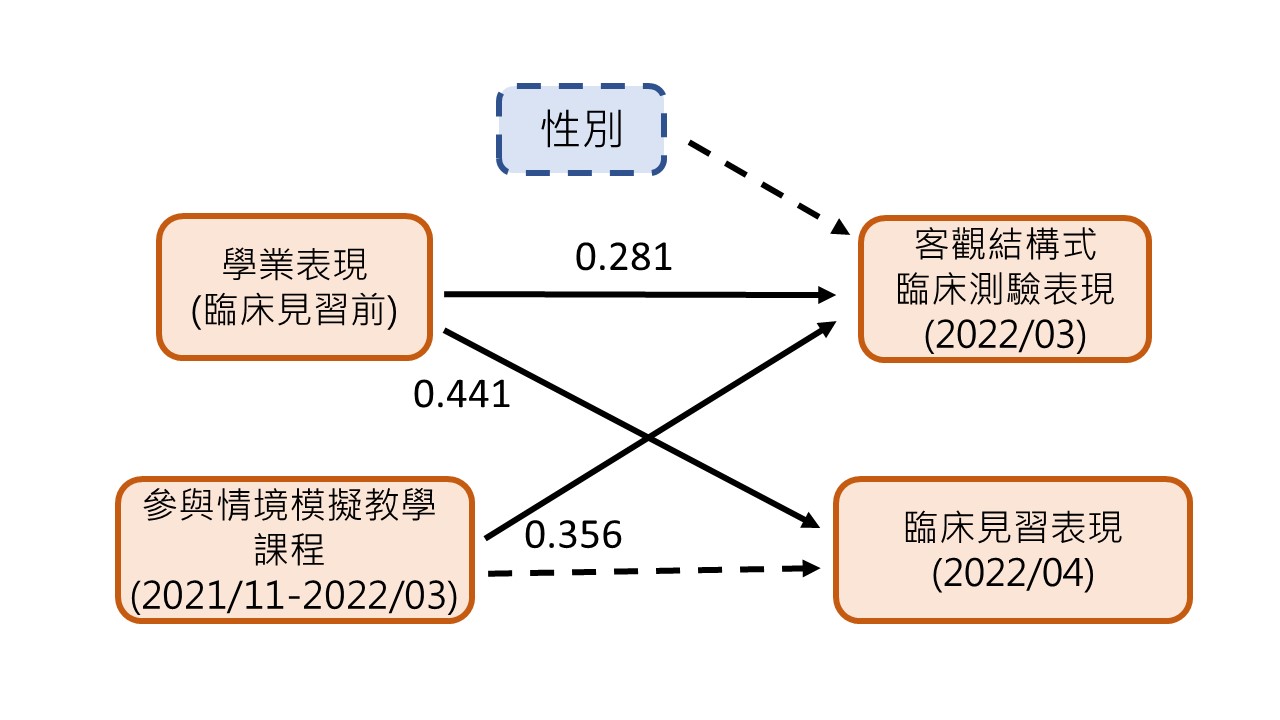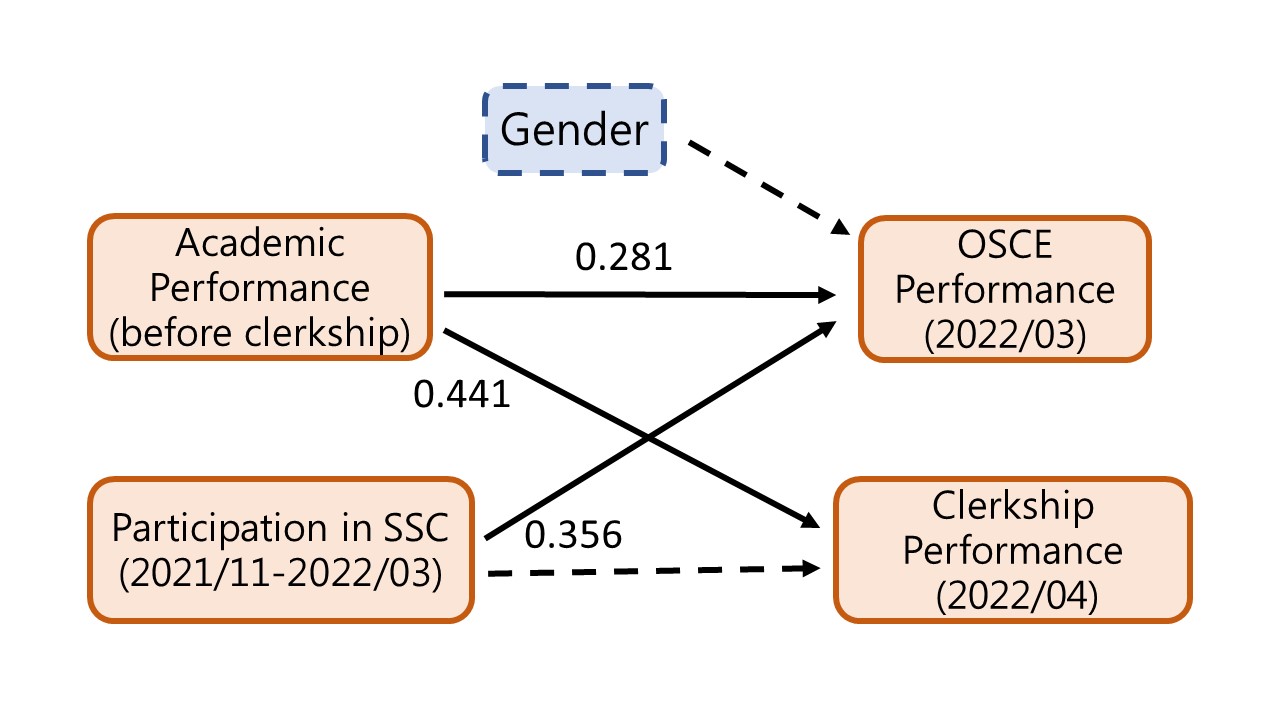情境模擬教學有效提升牙醫系學生的非操作性臨床能力和客觀結構式臨床測驗表現
情境模擬教學有效提升牙醫系學生的非操作性臨床能力和客觀結構式臨床測驗表現
1. 背景
與牙科病人溝通良好將能提升治療效果與病人滿意度。牙醫系學生於臨床見習前,學習與模擬病人面談,可促進以病人為中心的照護,並且降低臨床見習的衝擊。因此,本研究探討牙醫系學生參與情境模擬教學課程、學業表現、臨床見習表現及客觀結構式臨床測驗表現之間的關係。
2.方法
本研究以牙醫系五年級正在接受臨床見習訓練的學生為研究對象。透過路徑分析模型,探討學生參與情境模擬教學課程、學業表現、臨床見習表現及客觀結構式臨床測驗表現之間的相關性。
3. 結果
本研究共邀請87位五年級牙醫系同學參加情境模擬教學課程,其中大多數同學(n = 70, 80.46%)屬自願參加。路徑分析模型顯示,學業表現對客觀結構式臨床測驗表現有直接影響(β= 0.281, P = 0.003),對臨床見習表現亦有直接影響(β= 0.441, P < 0.001)。此外,情境模擬教學課程對客觀結構式臨床測驗表現也有直接影響(β = 0.356, P < 0.001)。
4.結論
情境模擬教學課程可以有效提升牙醫系學生的非操作性臨床能力及客觀結構式臨床測驗表現。於牙醫學教育中納入與模擬病人的互動,將能改善臨床溝通能力。根據我們的研究結果,我們建議在客觀結構式臨床測驗之前實施情境模擬教學課程教學,以提升學生的溝通及認知能力。
圖形摘要

學業表現、情境模擬教學課程參與、學業表現和客觀結構式臨床測驗表現相關的路徑分析模型。實線為標準路徑係數,虛線為非重要路徑。
應用與亮點:
1.開發台灣牙醫系學生第一個情境模擬教學課程。
2.此情境模擬教學課程,可作為台灣牙醫學教育的範本。
【研究團隊】
團隊成員:吳如惠、林佩蓁、李坤宗、劉信良、呂佩穎、李貞儀
代表單位:醫學教育暨人本化教育研究中心
團隊簡介:吳如惠為高雄醫學大學附設醫院牙科部主治醫師,同時與團隊中的林佩蓁、李坤宗及李貞儀皆為口腔衛生學系的老師,也與劉信良與呂佩穎老師在醫學教育暨人本化教育研究中心一起共同合作。
研究聯繫Email:mehhpe@kmu.edu.tw
【論文資訊】
論文出處:J.-H. Wu, P.-C. Lin, K.-T. Lee, H.-L. Liu, P.-Y. Lu, C.-Y. Lee, Situational simulation teaching effectively improves dental students’ non-operational clinical competency and objective structured clinical examination performance, BMC Medical Education 24(1) (2024) 533.https://doi.org/10.1186/s12909-024-05546-4
全文下載:https://bmcmededuc.biomedcentral.com/articles/10.1186/s12909-024-05546-4#citeas
Situational simulation teaching effectively improves dental students’ non-operational clinical competency and objective structured clinical examination performance
Situational simulation teaching effectively improves dental students’ non-operational clinical competency and objective structured clinical examination performance
Background
Appropriate communication with dental patients enhances treatment outcomes and patient satisfaction. Implementing simulated patient interviews courses can improve patient-centered care and reduce conflict during clerkship training. Therefore, this study explored the relationship among student participation in a situational simulation course (SSC), academic performance, clerkship performance, and objective structured clinical examination (OSCE) performance.
Methods
This study was conducted with a sample of fifth-year dental students undergoing clerkship training. After implementing a situational simulation course to investigate the relationship among participation in SSC, academic performance, clerkship performance, and OSCE performance, a path analysis model was developed and tested.
Results
Eighty-seven fifth-year dental students were eligible for the SSC, and most (n = 70, 80.46%) volunteered to participate. The path analysis model revealed that academic performance had a direct effect on OSCE performance (β= 0.281, P = 0.003) and clerkship performance (β= 0.441, P < 0.001). In addition, SSC teaching had a direct effect on OSCE performance (β= 0.356, P < 0.001).
Conclusions
SSCs can enhance dental students’ non-operational clinical competency and OSCE performance effectively. Simulated patient encounters with feedback, incorporated into the dental curricula, have led to improved communication. Based on our findings, we suggest implementing SSC teaching before the OSCE to improve communication and cognitive skills.
Keywords Clinical simulation education, Simulated patient, Objective structured clinical examination, Undergraduate dental students.
Graphical Abstract:

Path analysis model relating academic performance, situational simulation teaching, clerkship performance, and OSCE performance. Standardized path coefficients are presented. Dashed lines represent non-significant paths. OSCE, objective structured clinical examination.
Application and Highlights:
1. The first situational simulation teaching course for dental undergraduate students in Taiwan was developed.
2. This situational simulation teaching course can serve as a model for dental education in Taiwan.
Research Team Members: Ju-Hui Wu, Pei Chen Lin, Kun-Tsung Lee, Hsin-Liang Liu, Peih-Ying Lu, Chen-Yi Lee
Representative Department: Center for Medical Education and Humanizing Health Profession Education
Introduction of Research Team: Ju-Hui Wu is an attending staff member in the Department of Dentistry at Kaohsiung Medical University Hospital. She, along with her team members (Pei Chen Lin, Kun Tsung Lee, and Chen-Yi Lee), teaches in the Department of Oral Hygiene at the College of Dental Medicine, Kaohsiung Medical University. Additionally, she collaborates with Hsin-Liang Liu and Peih-Ying Lu in the Center for Medical Education and Humanizing Health Professional Education at Kaohsiung Medical University Hospital.
Contact Email: mehhpe@kmu.edu.tw
Publication: J.-H. Wu, P.-C. Lin, K.-T. Lee, H.-L. Liu, P.-Y. Lu, C.-Y. Lee, Situational simulation teaching effectively improves dental students’ non-operational clinical competency and objective structured clinical examination performance, BMC Medical Education 24(1) (2024) 533.https://doi.org/10.1186/s12909-024-05546-4
Full-Text Article:
https://bmcmededuc.biomedcentral.com/articles/10.1186/s12909-024-05546-4#citeas


